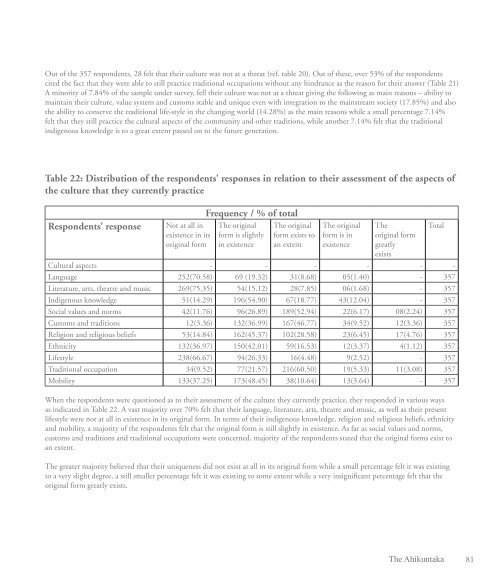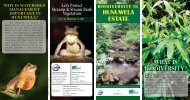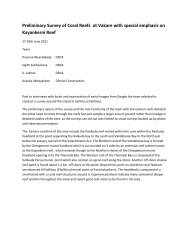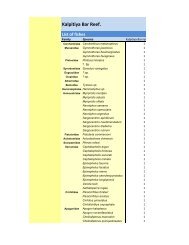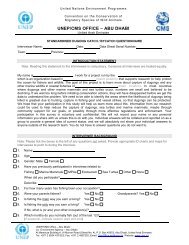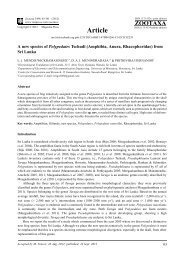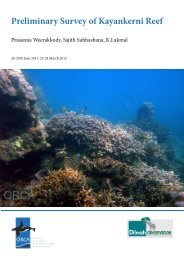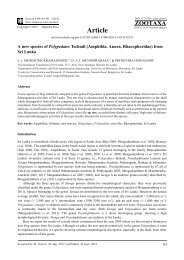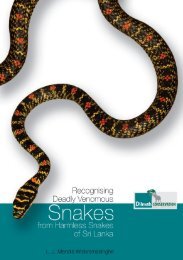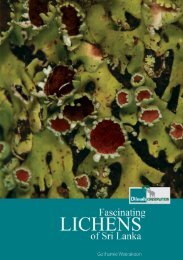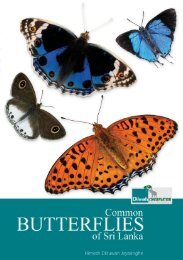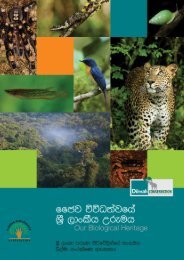The Ahikuntaka
A publication documenting the lives and livelihoods of the Ahikuntaka or gypsy community in Sri Lanka. A collection of vibrant photographs and a baseline survey on the current socio economic status of the Ahikuntaka conducted by the Colombo University complement this timely publication.
A publication documenting the lives and livelihoods of the Ahikuntaka or gypsy community in Sri Lanka. A collection of vibrant photographs and a baseline survey on the current socio economic status of the Ahikuntaka conducted by the Colombo University complement this timely publication.
Create successful ePaper yourself
Turn your PDF publications into a flip-book with our unique Google optimized e-Paper software.
Out of the 357 respondents, 28 felt that their culture was not at a threat (ref. table 20). Out of these, over 53% of the respondents<br />
cited the fact that they were able to still practice traditional occupations without any hindrance as the reason for their answer (Table 21)<br />
A minority of 7.84% of the sample under survey, fell their culture was not at a threat giving the following as main reasons – ability to<br />
maintain their culture, value system and customs stable and unique even with integration to the mainstream society (17.85%) and also<br />
the ability to conserve the traditional life-style in the changing world (14.28%) as the main reasons while a small percentage 7.14%<br />
felt that they still practice the cultural aspects of the community and other traditions, while another 7.14% felt that the traditional<br />
indigenous knowledge is to a great extent passed on to the future generation.<br />
Table 22: Distribution of the respondents’ responses in relation to their assessment of the aspects of<br />
the culture that they currently practice<br />
Respondents’ response<br />
Not at all in<br />
existence in its<br />
original form<br />
Frequency / % of total<br />
<strong>The</strong> original<br />
form is slightly<br />
in existence<br />
<strong>The</strong> original<br />
form exists to<br />
an extent<br />
<strong>The</strong> original<br />
form is in<br />
existence<br />
<strong>The</strong><br />
original form<br />
greatly<br />
exists<br />
Cultural aspects - - - - - -<br />
Language 252(70.58) 69 (19.32) 31(8.68) 05(1.40) - 357<br />
Literature, arts, theatre and music 269(75.35) 54(15.12) 28(7.85) 06(1.68) - 357<br />
Indigenous knowledge 51(14.29) 196(54.90) 67(18.77) 43(12.04) - 357<br />
Social values and norms 42(11.76) 96(26.89) 189(52.94) 22(6.17) 08(2.24) 357<br />
Customs and traditions 12(3.36) 132(36.99) 167(46.77) 34(9.52) 12(3.36) 357<br />
Religion and religious beliefs 53(14.84) 162(45.37) 102(28.58) 23(6.45) 17(4.76) 357<br />
Ethnicity 132(36.97) 150(42.01) 59(16.53) 12(3.37) 4(1.12) 357<br />
Lifestyle 238(66.67) 94(26.33) 16(4.48) 9(2.52) - 357<br />
Traditional occupation 34(9.52) 77(21.57) 216(60.50) 19(5.33) 11(3.08) 357<br />
Mobility 133(37.25) 173(48.45) 38(10.64) 13(3.64) - 357<br />
When the respondents were questioned as to their assessment of the culture they currently practice, they responded in various ways<br />
as indicated in Table 22. A vast majority over 70% felt that their language, literature, arts, theatre and music, as well as their present<br />
lifestyle were not at all in existence in its original form. In terms of their indigenous knowledge, religion and religious beliefs, ethnicity<br />
and mobility, a majority of the respondents felt that the original form is still slightly in existence. As far as social values and norms,<br />
customs and traditions and traditional occupations were concerned, majority of the respondents stated that the original forms exist to<br />
an extent.<br />
<strong>The</strong> greater majority believed that their uniqueness did not exist at all in its original form while a small percentage felt it was existing<br />
to a very slight degree, a still smaller percentage felt it was existing to some extent while a very insignificant percentage felt that the<br />
original form greatly exists.<br />
Total<br />
<strong>The</strong> <strong>Ahikuntaka</strong><br />
81


